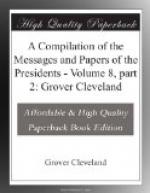I also ask your attention to the views expressed by him in reference to the employment of war steamers and in regard to the contracts for the transportation of the United States mails and the operation of the system upon the prosperity of the Navy.
By an act of Congress passed August 14, 1848, provision was made for extending post-office and mail accommodations to California and Oregon. Exertions have been made to execute that law, but the limited provisions of the act, the inadequacy of the means it authorizes, the ill adaptation of our post-office laws to the situation of that country, and the measure of compensation for services allowed by those laws, compared with the prices of labor and rents in California, render those exertions in a great degree ineffectual. More particular and efficient provision by law is required on this subject.
The act of 1845 reducing postage has now, by its operation during four years, produced results fully showing that the income from such reduced postage is sufficient to sustain the whole expense of the service of the Post-Office Department, not including the cost of transportation in mail steamers on the lines from New York to Chagres and from Panama to Astoria, which have not been considered by Congress as properly belonging to the mail service.
It is submitted to the wisdom of Congress whether a further reduction of postage should not now be made, more particularly on the letter correspondence. This should be relieved from the unjust burden of transporting and delivering the franked matter of Congress, for which public service provision should be made from the Treasury. I confidently believe that a change may safely be made reducing all single-letter postage to the uniform rate of 5 cents, regardless of distance, without thereby imposing any greater tax on the Treasury than would constitute a very moderate compensation for this public service; and I therefore respectfully recommend such a reduction. Should Congress prefer to abolish the franking privilege entirely, it seems probable that no demand on the Treasury would result from the proposed reduction of postage. Whether any further diminution should now be made, or the result of the reduction to 5 cents, which I have recommended, should be first tested, is submitted to your decision.
Since the commencement of the last session of Congress a postal treaty with Great Britain has been received and ratified, and such relations have been formed by the post-office departments of the two countries in pursuance of that treaty as to carry its provisions into full operation. The attempt to extend this same arrangement through England to France has not been equally successful, but the purpose has not been abandoned.
For a particular statement of the condition of the Post-Office Department and other matters connected with that branch of the public service I refer you to the report of the Postmaster-General.




